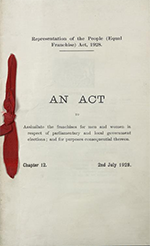The United Kingdom's Representation of the People Act 1928
The Representation of the People Act 1928 was a bill that gave all women in the United Kingdom who were over 21 the right to vote. Only 10 years before, Parliament had passed the Representation of the People Act 1918, which had for the first time given any women the vote. That bill applied certain restrictions to female potential voters: They had to be at least 30 years old, and they had own property or have a husband who did. That act also enabled the vote for all men over 21, regardless of property ownership. It took a decade longer for women to gain the same privilege. At various times throughout the 19th Century, Parliament had relaxed the conditions for voting. The Reform Act 1832 had expanded the voter rolls by a few hundred thousand, but the number of people who could vote was still a small minority of the overall population. The Reform Act 1867 had added 1.5 million more men to the voter rolls, but it was still only one-third of all eligible males in the population. And it was during debate over this, the Second Reform Bill, that philosopher and Member of Parliament (MP) John Stuart Mill first proposed the idea of granting women the vote. 
The proposal went down to defeat, but groups like the National Union of Women's Suffrage Societies, led by Millicent Fawcett, and the Women's Social and Political Union, led by the Pankhurst family, kept the pressure on their elected officials, employing all manner of strategies to press their case that what they were being denied was a fundamental right. Their long years of marching, campaigning, gathering signatures for petitions, protesting, enduring force feeding as a result of hunger strikes, and many other activities had finally resulted in the achievement of their goal, in part. Ten years later, they achieved the final goal. The 1928 bill, known also as the Fifth Reform Act or the Equal Suffrage Act, was a simple idea yet a powerful emancipation. For the first time, all women were equal under the law to all men–at least as far as those 21 and over. The bill became law by Royal Assent on July 2, 1928. The onetime NUWSS leader Millicent Fawcett was still alive to see the final victory won. (WSPU leader Emmeline Pankhurst had died just weeks before the bill became law.) |
|
Social Studies for Kids
copyright 2002–2026
David White




